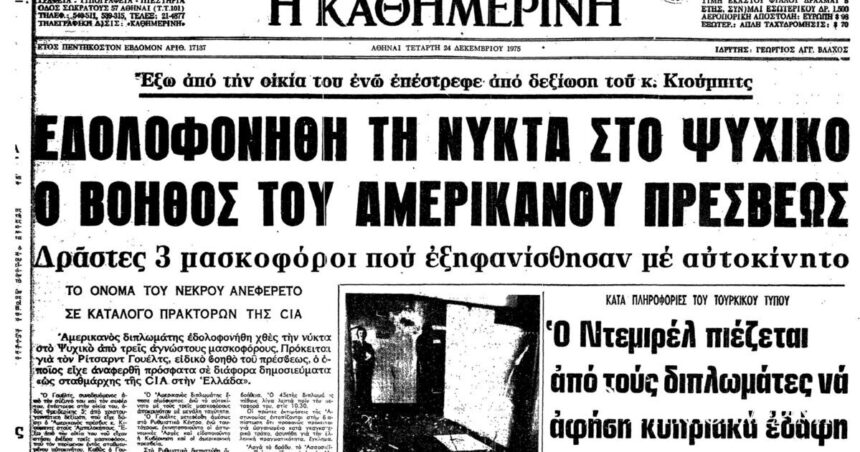Richard Wells was the highest-ranking CIA officer killed in the line of duty, and the first Station Commander to be politically motivated.
Born in Hartford, Connecticut, in December 1929, and raised in Providence, Rhode Island, Wells would graduate from Harvard, where he had majored in classical studies with an emphasis on Greek history and literature. In the early 1950s, he sought a job at the Central Intelligence Agency (CIA). He finally joined the Service in July 1951, with his first tour of duty in Europe beginning a few months later in February 1952. There he quickly distinguished himself with his language abilities, operational skills and excellent knowledge of European politics. He would remain in Europe for three consecutive seasons. In 1958, he was transferred to Washington, where he was assigned to deal with Turkish affairs. Then, and for the next ten years, he served in the Western Hemisphere Division, with missions to many South American countries.
In the spring of 1975, however, at the age of 45, Wells was asked to go to Greece as CIA Station Commander. The big problem, however, would begin when his identity and address were revealed in foreign and Greek publications, which endangered the safety of both himself and his family.
On the evening of December 23, 1975, Wells and his family were at a Christmas party at the American ambassador’s residence. While returning to their residence, Wells would be fatally shot. “Kathimerini” characteristically reports on the front page of December 24: “Welch, accompanied by his wife and his chauffeur, was returning to his home, 5 Frederikis Street, from a Christmas party […] Outside his house, three masked men had set up an ambush for him, who were waiting for him in a parked car. As Welch got out of his car, one of the masked men shot him repeatedly and at close range. The American diplomat fell down covered in blood, while the car with the three masked men drove away at high speed. […] The first assessments of the police are found in the finding that this is obviously a crime organized in a gangster way, unusual for the Greek reality”.
Five days after the attack, a terrorist group called the November 17 Revolutionary Organization claimed responsibility for his murder. The arrest of those responsible would take place almost 28 years later – in 2003. They would be convicted of their other acts – but not of Wells’s murder due to the lapse of 20 years and the associated statute of limitations.
Wells’s assassination was a major blow to the CIA and further soured the mood in Washington as it coincided with the end of a year of back-to-back revelations about the CIA and the broader US intelligence community by the Senate Churches Committee, the first attempt to reveal any abusive and illegal acts that had been committed in secret and limitation of its power. But it would also lead to the passage of the Identity Protection Act of 1982, which makes it illegal to reveal an agent’s name.
By order of President Gerald Ford, Wells was buried at Arlington National Cemetery and awarded the Distinguished Intelligence Cross.
Column editor: Myrto Katsigera, Vassilis Minakakis, Antigoni-Despina Poimenidou, Athanasios Syroplakis





